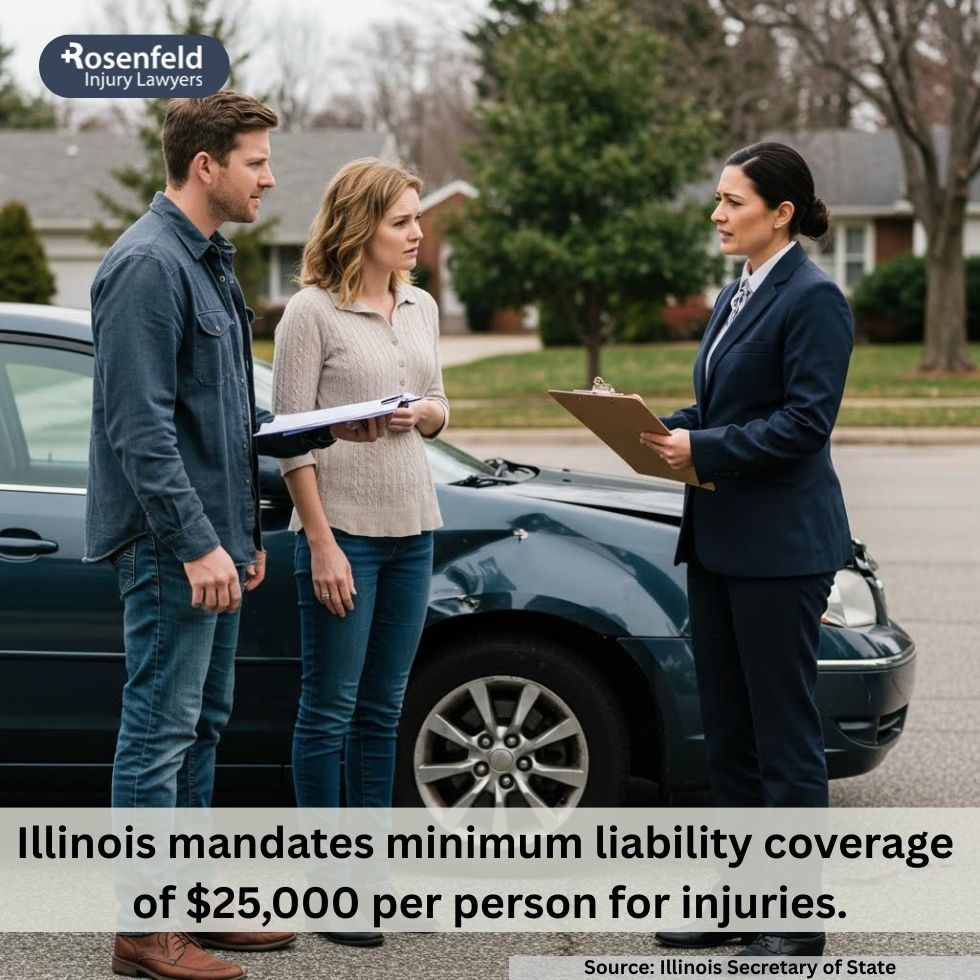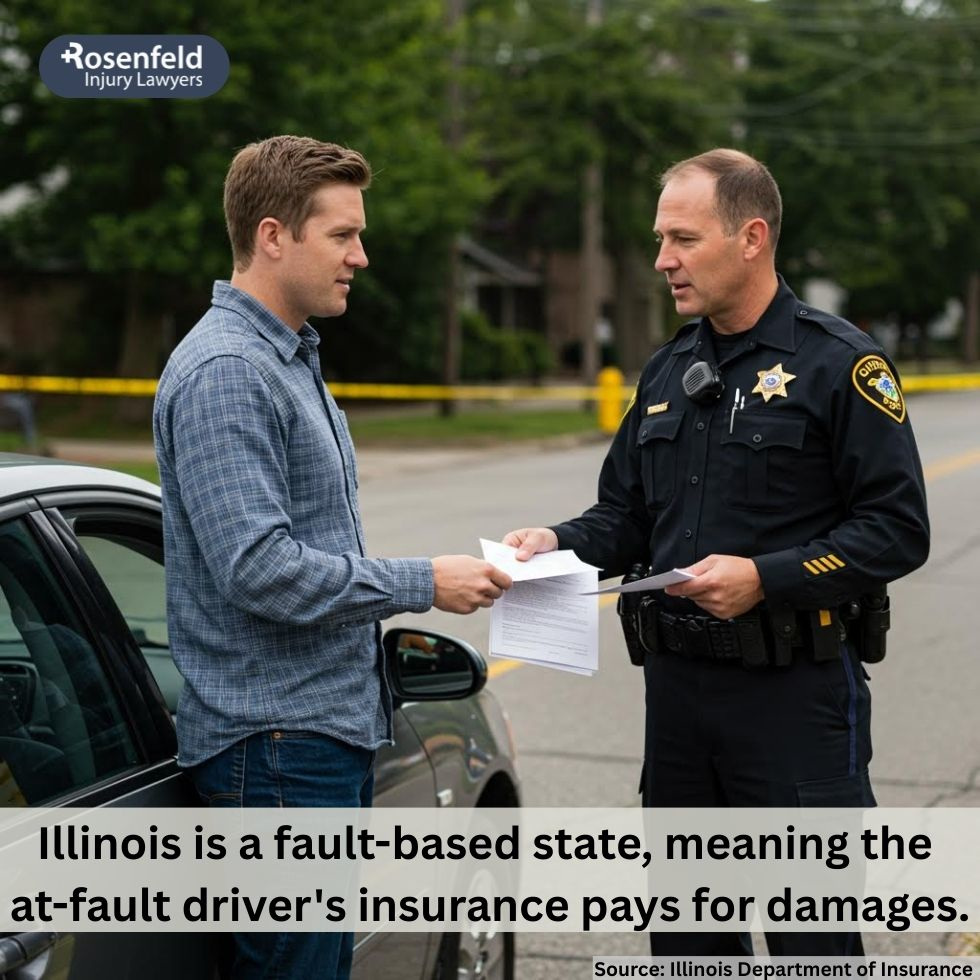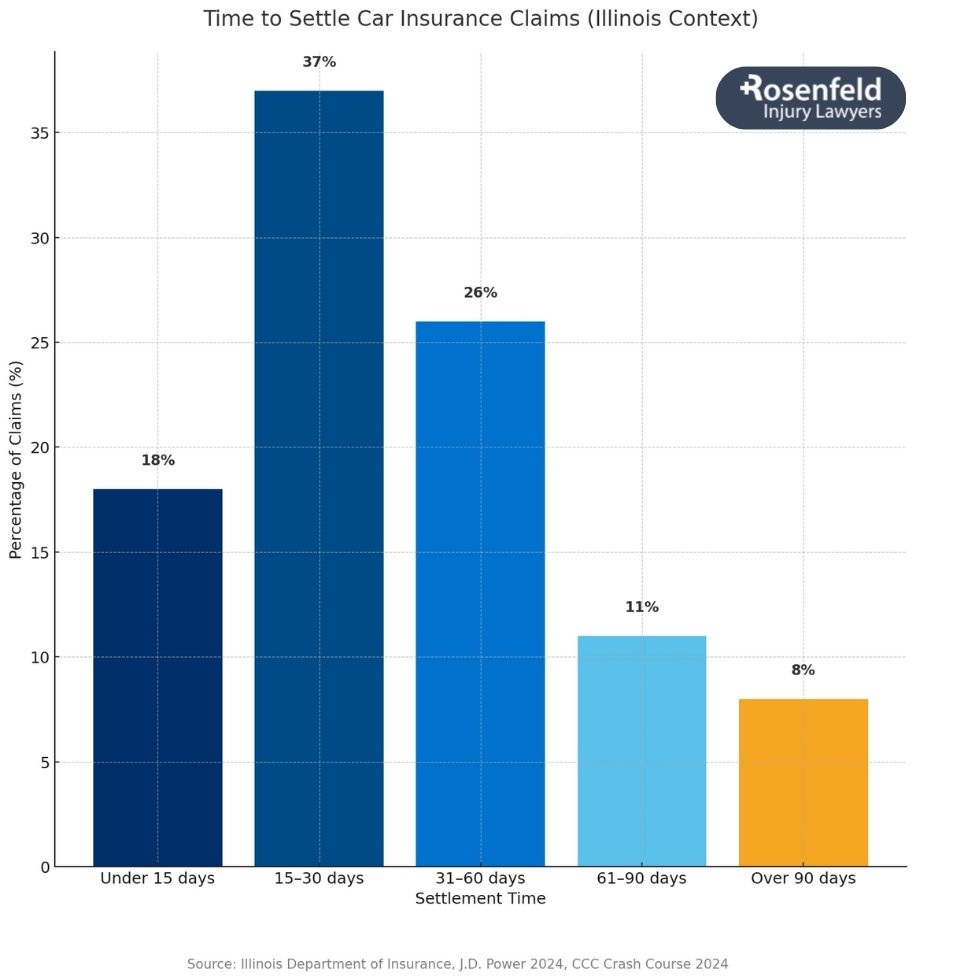- 24/7 Free Consultation: (888) 424-5757 Tap Here To Call Us
How to File a Car Insurance Claim in Illinois

Getting into a car accident is stressful—especially when you’re dealing with vehicle damage, medical bills, and the confusion of filing a car insurance claim. In Illinois, knowing your rights and following the proper steps can protect your financial recovery.
This article walks you through every part of the auto insurance claim process in Illinois—from what to do after a crash, how to deal with the insurance company, how to respond to low or denied offers, and when to contact a lawyer for help.
Your Rights Under Illinois Law
If you have auto insurance in Illinois, you’re protected by state law throughout the insurance claim process. Every insurance company operating in the state is required to treat claims fairly, promptly, and in good faith.
Under 215 ILCS 5/154.6, it’s considered an unfair claims practice if an insurer:
- Delays acknowledging your claim
- Fails to investigate reasonably
- Doesn’t affirm or deny coverage within a reasonable time or
- Refuses to make a fair settlement offer when liability is clear
50 Ill. Adm. Code § 919.40 strengthens these protections, requiring insurers to:
- Respond to your communications within 15 working days;
- Make a good-faith effort to contact all involved parties within 21 working days after notice of a claim.
If your vehicle is deemed a total loss, 50 Ill. Adm. Code § 919.80(c) requires that the insurance company base their offer on the fair market value just before the accident, using reputable sources. You’re also entitled to request documentation showing how that value was calculated.
If these rules are violated, you can file a complaint with the Illinois Department of Insurance.
The Importance of Following Proper Procedures
Failure to follow the correct steps can lead to delays, denied claims, or reduced compensation. In Illinois, both your insurance company and the other driver’s insurer expect prompt reporting and complete documentation.
Waiting too long to report the accident may violate your policy terms, risking your ability to recover repair shop costs, medical bills, or other losses. Insurers may argue that delays or missing documents prevented them from conducting a fair investigation.
If your lack of cooperation causes substantial prejudice to the insurer, they may legally deny or reduce your claim. Being timely, detailed, and organized protects your rights.

Immediate Steps to Take After a Car Accident in Illinois
Your actions right after a crash can shape your insurance claim and protect your safety.
Assess Injuries and Move to a Safe Location
Call 911 if anyone is hurt. If it’s safe, move vehicles out of traffic. Never leave the scene—doing so can result in criminal penalties.
Call 911 and Report the Accident to the Police
You must report accidents involving injury, death, or over $1,500 in damage. Police will file an official report, which is crucial for proving fault. If no officer responds, you must file a crash report with the Illinois Department of Transportation within 10 days.
Exchange Information with the Other Driver
Get:
- Full names, contact info
- Driver’s license and plate numbers
- Insurance company and policy numbers
Avoid admitting fault—that’s for the claims adjuster to determine.
Document the Scene
Take photos and/or videos of all vehicles, damage, road signs, conditions, and visible injuries.
Gather Witness Information
Witnesses can be key if fault is disputed. Get their names and contact information.
Seek Medical Attention, Even for Seemingly Minor Injuries
Even minor injuries can get worse. Get evaluated promptly and keep all records. Delays can hurt both your recovery and your car insurance claim.
Policies Involved in the Illinois Auto Insurance Claim Process
Illinois is an at-fault state. The driver who caused the crash is legally responsible for repair costs, medical expenses, and related losses. Here’s what types of car insurance coverage may apply:
- Liability Coverage – Mandatory in Illinois. Pays for others’ damages if you’re at fault, up to your policy limits.
- Medical Payments (MedPay) – Optional. Covers your medical bills regardless of fault.
- Collision Coverage – Pays for your vehicle’s repairs or replacement after an accident, minus your deductible.
- Uninsured/Underinsured Motorist Coverage (UM/UIM) – UM is required in Illinois. It covers you if the at-fault driver has no insurance or not enough.
- Comprehensive Coverage – Covers non-collision events like theft, vandalism, or weather damage.

Filing a Claim with Your Own Insurance Company
Whether you were at fault or not, it is essential to notify your insurer quickly to preserve your rights under your policy.
Contacting Your Insurance Company Promptly
Most insurance policies include a “notice of loss” provision that requires policyholders to report an accident as soon as possible. Such time limits are a condition of coverage. If you wait too long, your insurer may argue that the delay impaired their ability to investigate the claim, which could lead to denial.
You can usually file by phone, through a mobile app, or online. When you contact the company, have these documents and details ready:
- Your insurance policy number
- The date, time, and location of the accident
- Names and phone numbers of all drivers and witnesses
- A copy of the police report (if available)
- Photos or videos of vehicle damage or the crash scene
Providing Accurate and Detailed Informatio
Be honest and specific when explaining what happened. Avoid speculation about fault—just stick to the facts. Your insurance company will conduct its own investigation and work with the insurance adjuster to determine liability.
Understanding the Role of the Claims Adjuster
Once your car insurance claim is opened, it will be assigned to an insurance adjuster. This person evaluates the damage, determines repair costs, assesses fault, and may help estimate the value of your claim. They’ll likely reach out to you for more documents or to schedule a vehicle inspection.
While insurance agents are trained professionals, remember that they work for the insurance company—not for you. Their goal is to limit the company’s financial exposure. Be polite, but be careful in your conversations. You’re allowed to take time before agreeing to a settlement.
Keeping Records of All Communication
Keep detailed notes of every interaction with your insurance company, including:
- The names of agents or adjusters
- Dates and times of calls or emails
- What was said or promised
- Any forms, letters, or paperwork sent or received
This kind of paper trail can be crucial if your claim is delayed, undervalued, or denied.
Filing a Claim with the At-Fault Driver’s Insurance Company (Third-Party Claim)
If someone else caused your car accident, you can file a third-party insurance claim with their insurance company. In Illinois, the at-fault driver is legally responsible for damages.
After collecting their insurance info and the police report, notify their insurer that you’re filing a claim. You don’t need to give details right away—and you’re not required to provide a recorded statement without legal advice.
An insurance adjuster will likely contact you to investigate and discuss a settlement offer. Share documents, photos, and reports, but be careful about what you say. Don’t accept payment until you understand the full impact of your injuries and losses.
To support your claim, keep:
- Auto repair bills
- Medical records
- Proof of lost income
- Photos of injuries or damage
- Rental and towing receipts
The stronger your documentation, the stronger your claim.
What to Do if the At-Fault Driver is Uninsured or Underinsured
If the at-fault driver has no insurance or too little, your own Uninsured/Underinsured Motorist (UM/UIM) coverage may apply. UM is required in Illinois; UIM is optional but highly recommended.
UM covers you when the other driver does not have coverage. UIM kicks in when their policy limits don’t fully cover your losses. For instance, if your damages total $75,000 and their policy only pays $25,000, your UIM may cover the remaining $50,000—up to your policy’s limit.
Filing a UM/UIM claim is similar to a regular auto insurance claim, but it can get more complex. If you’re unsure whether the coverage applies or if your insurer pushes back, a lawyer can help protect your rights and guide you through the process.
Documenting Your Damages and Losses
Strong documentation is the foundation of a successful claim. Without it, your insurance company can deny or underpay you.
Track the following:
- Property Damage – Photos/video of damage, repair shop estimates, auto repair bills and towing receipts, rental car expenses
- Medical Records – ER visits, follow-ups, prescriptions, imaging and therapy, itemized medical bills
- Lost Wages & Out-of-Pocket Costs – Employer letter showing missed time, proof of income lost, receipts for medical equipment, transportation, etc.
Negotiating a Settlement with the Insurance Company
Once you’ve submitted your car insurance claim, the insurance company may offer a settlement—but it’s often less than what your claim is truly worth. Insurers try to minimize settlement amounts, no matter how much insurance either party has, especially if your damages aren’t fully documented or fault is in question.
Before accepting anything, make sure the offer includes all repair shop costs, medical bills, lost income, and future treatment if needed. If your vehicle is a total loss, confirm the valuation matches its fair market value.
You can push back. Send a written response explaining why the offer is too low, and include supporting documents. Stay professional and organized, and don’t feel pressured to settle quickly. If the company delays or offers a low amount, an attorney can step in to negotiate, escalate the issue to the state, or file a lawsuit if needed.

What to Do if Your Claim is Denied or Underpaid
If your claim is denied or underpaid, you still have options. Under Illinois law, the insurance company must explain in writing why the claim was denied or reduced.
Review that letter carefully—errors or missing information are common. If you disagree, send a formal dispute with updated estimates, medical records, or proof of fault. Some policies require you to appeal internally before moving forward.
If that fails, you can file a complaint with the Illinois State Insurance Department, which investigates insurance misconduct. As a last resort, legal action may be necessary—but remember, there is a time limit of two years from the date of the accident to file an auto accident lawsuit (735 ILCS 5/13-202).
Secure Expert Legal Counsel!

If your claim has been denied, underpaid, or delayed—or if you’re facing a serious injury, a total loss, or an uninsured driver—our experienced legal team is here to help. Our car accident attorneys know how to deal with insurance companies, challenge bad settlement tactics, and recover the money you’re legally entitled to under Illinois law.
At Rosenfeld Injury Law, we handle auto insurance claims every day. We’ll review your case, explain your options, and fight for the full compensation you deserve—whether it’s through negotiation, appeal, or litigation.
Call (888) 424-5757 or fill out our online form to book a free consultation.
All content undergoes thorough legal review by experienced attorneys, including Jonathan Rosenfeld. With 25 years of experience in personal injury law and over 100 years of combined legal expertise within our team, we ensure that every article is legally accurate, compliant, and reflects current legal standards.







